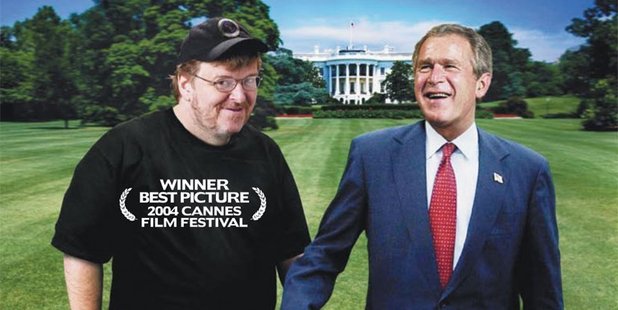Michael Moore was one of few liberals who predicted Donald Trump’s victory last November, and since then he’s returned to his crystal ball to add a few other prophecies.
Shortly after the election, he told the hosts of Morning Joe that Trump wouldn’t last a term – he’d be impeached or resign first.
Then, last month, during the Tribeca Film Festival, Moore slightly amended that forecast, saying that, in fact, Trump would get booted during his second term.

Moore isn’t done, though. He’s making another prognostication – and this time he’s actively working to make it come true.
“I’m making a movie to get us out of this mess,” the filmmaker wrote on his Facebook page. “Fahrenheit 11/9. I’ve f***ing had it.”
That title is a callback to the 2004 documentary he made about George W Bush and the Iraq War, Fahrenheit 9/11, which is still the highest-grossing documentary of all time after pulling in more than US$220 million worldwide.
The 11/9 of the new title refers to November 9, the date that Trump was declared winner of the presidential election.
In a statement, Harvey and Bob Weinstein, who acquired the movie, said the film may be the “key in dissolving Trump’s ‘Teflon’ shield and, in turn, his presidency”.
For his part, Moore added, “No matter what you throw at him, it hasn’t worked. No matter what is revealed, he remains standing. Facts, reality, brains cannot defeat him. Even when he commits a self-inflicted wound, he gets up the next morning and keeps going and tweeting.
“That all ends with this movie.”
That’s quite a prediction.
The film is still in production and Moore isn’t divulging details, so it’s hard to say what his team has dug up that’s giving him so much confidence.
But the question remains: Is Moore really the guy who’s going to take down a president? Because, let’s not forget, he’s tried before.
Moore made no secret of his motivations with Fahrenheit 9/11 back in 2004. After all, it was a movie critical of the Bush administration that debuted during an election year.
“I would like to see Mr Bush removed from the White House,” Moore said on This Week With George Stephanopoulos that year. In a USA Today interview around the movie’s debut, he added, “This may be the first time a film has this kind of impact.”
Getting the movie to theatres before the ballots were cast, however, was a bit of a mad dash. The release of Fahrenheit 9/11 was initially stymied by a disagreement between the Weinstein’s production company, Miramax, and its parent company, Disney, whose CEO, Michael Eisner, didn’t want to release the film.

But time was of the essence, so Moore opened up to the New York Times and the resulting story, with the headline “Disney Is Blocking Distribution of Film That Criticizes Bush,” did the trick. About six weeks after the story ran, Fahrenheit hit theatres.
(The kerfuffle led to the Weinsteins leaving Miramax, a company they founded, and there still may be some sour grapes. Back to the brothers’ statement: “When we had the opportunity to work with (Moore) on ‘Fahrenheit 9/11,’ we were so persistent that we ultimately had to part ways from Disney and we lost our beloved Miramax, named after our parents, because we believed so strongly in the message.”)
The rush to release Fahrenheit made sense considering the subject matter. Moore wanted the American people to see that Bush had hastily led the US into a misguided war. Then voters would have all the facts by the time the election rolled around in November. It worked, to some extent; a lot of people went to see what conservative pundits at the time labeled anti-Bush propaganda.
And yet Bush was elected to a second term, beating John Kerry.
Will Moore be thwarted again? Maybe, but the filmmaker can rest easy knowing he’s done everything he can to take down a man he’s called a racist, misogynist authoritarian.
This isn’t the first movie Moore made about Trump. In October, he released TrumpLand, which was basically a filmed monologue. In a review of the movie, Washington Post critic Ann Hornaday wrote, “although Moore clearly perceives TrumpLand to be his own version of an October surprise, it’s less game-changing than reassuring, especially to left-leaning voters, some of whom may still be having trouble casting a vote for a candidate they see as fatally centrist, corporation-friendly and untrustworthy.”
That critique echoes why Moore’s 2004 film also failed to alter the election results.
“Fahrenheit 9/11 may very well be the best political commercial in history,” wrote political science professor Costas Panagopoulos in 2004. “But like most political commercials, even really good ones, Fahrenheit 9/11 is unlikely to change enough voters’ minds to alter the outcome of the election.”
Anyone arguing that there’s a limit to what Moore’s movies can accomplish should know that the documentarian isn’t stopping with films. Aside from copious interviews and a “10-point plan” to stop Trump, he’ll be directing and starring in a new TNT show, Live From the Apocalypse, about contemporary politics.
He also announced earlier this month that he’d be performing on Broadway this summer, doing a show about – what else? – the commander in chief. It’s called The Terms of My Surrender and the tagline reads, “Can a Broadway show take down a sitting President?”







